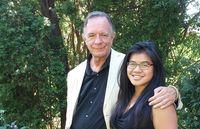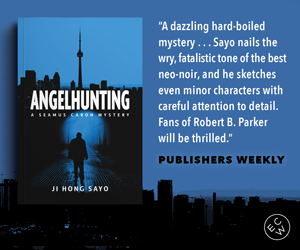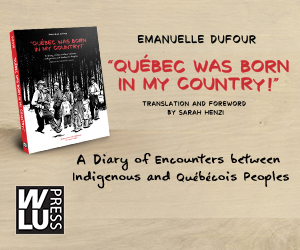Special Feature: Pedlar Press Interviews David White
What defines a family? Is it an arbitrary list of members, or is it the love and commitment that binds people to one another for life? David White didn't expect to find a family when he temporarily moved in with his friend Judy and her adopted daughter Shen, but the three soon found themselves in an unorthodox but deeply bonded family. From 1997 until 2016, David wrote poems about their family, including Shen's early life, and their trip to China to see the orphanage where she spent her first year.
The Lark Ascending (Pedlar Press) is the culmination of those poems. Today we host a special interview with David, conducted by Pedlar Press publisher Beth Follett. They speak about David's experience of debuting a first solo collection at 62 years old, the concept of Double Happiness and how it informed the book, and why The Lark Ascending, a title taken from composer Ralph Vaughan Williams' piece of the same name, was the right title for David's collection.
The Lark Ascending will launch at the Landon Branch of the London Public Library on February 22, 2017 at 7:00pm.
Beth Follett for Open Book:
Pedlar Press will release a collection of your poems, The Lark Ascending, on February 22 in London. Are you suffering any nerves about the launch of this debut work?
David White:
Making a debut at the age of 62 is in and of itself more a source of amusement than nervousness. Also, I have another manuscript that’s very close to being ready to submit, written before, during, and after the writing of The Lark Ascending, so I’m not worried/nervous about what’s next. However, when Shen was home over the holidays, she did some babysitting for a couple who live a few doors up the street from us; they told her they were planning on attending the book launch at the Landon branch of the Library, about two blocks from where we live. She was a bit surprised that they knew about it, but they explained that they had seen the poster in the library with the author photo on it advertising the event. Also someone who works with Judy had also seen the poster and was hoping to attend the launch. So it is beginning to dawn on me that this book which I’ve been writing over the past 20 years is about to have a more public existence.
The only thing that I’m nervous about as the book becomes more public is the swing to a more extreme right that appears to be taking place. The book is about a straight woman, a gay man, and a Chinese child forming a family. We’re an LGBT, mixed race family with an immigrant child; as such we represent the opposite of everything someone like Donald Trump stands for.
BF:
You dedicate the work to Shen, and choose the symbol for Double Happiness for the dedication page. The symbol, you tell the reader, is formed by the character for the word happiness used twice, a common feature of design on a wide range of things, from porcelain to textiles and wood carvings. This collection is full of your feelings of awe and delight, finding yourself, a gay man, in the unusual position of co-parenting an adopted Chinese girl who was abandoned in the streets of Hefei in 1995. In what ways do the awe and the double happiness continue to this day?
DW:
We have a ginger jar at home that has the symbol on it repeated many times; that’s where we keep our Canadian Tire money. I think it’s often the quite simple, almost mundane things that tend to inspire that feeling of the unexpected, the surprise of awe. I suppose some of it comes from never expecting that parenting was going to be a part of my life, and I was in my early 40s when it started, so I’d already had a completely different life before I became a parent. The kind of things that captured my attention were things like a child with chicken pox; trying to turn the backyard into a child friendly space; the confusion of a tech rehearsal for a Chinese New Year’s celebration. I think that is true for the poems about the trip to China as well; they come out of cultivating a habit of awe. I guess that the awe comes out of paying attention, looking closely at what’s there, what’s happening around you, noticing what’s there outside the window on a long train ride when your child’s energy explodes into your reverie. And sometimes the awe expresses itself as amusement about the experience of the different foods and eating experiences in China.
Also, Shen has become a classically trained musician, and we regularly get to hear her perform; that’s a source of awe for me. And just because your child is an adult doesn’t mean you stop being a parent, so yes while the book ends on that bittersweet feeling of the empty nest, I continue to be surprised by what just happens to come my way.
In fact the publishing of this book is sort of like that, something that just happened to come my way. I sent the manuscript off to Stan Dragland after he had given a reading from his first volume of essays on Newfoundland literature and culture, Strangers & Others. Stan supervised me for my Master’s thesis on Gwendolyn McEwan (I was one of his students in what he calls “Peyton course” in Apocrypha) and he has always been supportive. There was his address right there in the book, and I had this manuscript, so I just mailed it to him, not realizing that it was also the address of Pedlar Press. I was hoping for some suggestions. By the time I heard back, an offer to publish, with Stan as editor, was a part of the response. So getting to be someone’s parent, writing about it, and then having the book published sounds like a lot of double happiness going on.
Your CanLit News
Subscribe to Open Book’s newsletter to get local book events, literary content, writing tips, and more in your inbox
BF:
Has your reading changed in these years of a more devoted writing practice? Have you discovered someone who feels essential for you to be reading at this time? Who are the writers you return to again and again?
DW:
I have followed Stan Dragland’s writing though various genres over the years; reading him is the same as listening to him talk. I also took undergraduate and graduate courses from Don McKay, so I have eagerly followed his work. In fact Don was one of the examiners of my Master’s thesis, and he gave me a copy of Lightning Ball Bait, which had just then been published by Coach House, as a gift at the end of my defense. I don’t consider myself a nature poet, the way that McKay is a nature poet, but his way of encountering the unknowable, with careful observation and response, has certainly had an impact on my own poetic practice; my own encounters with the unknowable in this book are at once more domestic and exotic, all deriving from parenting a Chinese child.
I’ve also followed Lorna Crosier and Jan Zwicky’s work over the years, admiring their close, careful attention to detail. And Zwicky’s use of music is also something that resonates with me, since I find myself intentionally listening to a piece to write about the emotions that music stirs up. I was reading Michael Crummey’s volume Little Dogs: New and Selected while I was working on the revisions for my book, and there from his first volume of poetry was a poem set in Hefei, Anhui province, China, my daughter’s hometown! His poems have an immediacy to them that appeals to me (he’s a pretty good novelist too).
Gay writers have been important in my development. Edmund White in fiction and Mark Doty in poetry, to limit the voices to a few that have been important. And gay Canadian writers like John Barton, Shyam Selvaduria, and Daniel Zomperelli I read eagerly.
Through Stan’s collection of essays I’ve encountered Agnes Walsh’s poetry, which has become important to me. Also Laurie D. Graham, who was a colleague of mine here at Fanshawe until she became the editor of Brick magazine; I took advantage of my easy access to her mailbox in the office, and dropped off a copy of The Lark Ascending around the same time I sent it off to Stan. And just in the last year I’ve encountered the poetry of Jacob McAurthur Mooney and Andy McGuire, neither of whom write anything like me, but whose work really interests me. I should stop now, but I could go on and on and…
BF:
You belong to a poetry group that meets monthly in London, and you thank your fellow members in your book’s acknowledgements. How does this group serve you? Are the activities of the group weighted in any particular direction, by which I mean, do you think everyone in the group benefits equally from the groups’ overall activities?
DW:
First and foremost is a plain and simple boost of confidence. Writing is a pretty lonely business, especially in a project like this one, which has taken twenty years, wondering if it is any good. The members of the group have changed over the years. David Huebert, who published his wonderful debut collection, We Are No Longer The Smart Kids In Class in 2016, was a member for a while; I miss his ear. There is now a writer of fiction in the group as well as a graphic novelist. The group provides on a monthly basis what Don McKay calls “the gift of ears,” careful attention. Usually when I start writing a piece, I’m not entirely sure where it’s going; sometimes I’m not even sure what’s it’s about, exactly. So offering it to other ears helps with not just the fine-tuning but the realization of what it is you’re trying to say.
BF:
Will you talk at some length about the reasons why the title, from Vaughan Williams's The Lark Ascending, seemed like the correct one for your collection?
DW:
As I mentioned earlier, I have always turned to music for inspiration. I’ll choose something and interrogate how it makes me feel. In this case, Judy and I had driven to Pearson airport to pick Shen up on her return from Paris. Her cousin Rachel, who took the author photo, was studying in Paris for the semester, and both she and Shen had the same reading week. Shen could stay in Rachel’s room in residence in Paris very cheaply. It was the second time Shen had been in Paris; the first time was when she was sixteen, on pilgrimage with a group of youth to the monetary in Taizé. Shen was in her first year studying music at York (she auditioned on the erhu, but has since switched her focus to the clarinet). Of course it meant that we would miss out on having Shen at home for the week.
We picked her up at the airport, had dinner, and then dropped her off at her residence. The next morning we had breakfast together and dropped her off at a friend’s party in Brampton, and then just drove home. When we got home, I listened to The Lark Ascending, and I was holding the Taizé cross that Shen gave me when she came home from France the first time, and this overwhelming feeling of the empty nest came up in response to this beautiful music. A friend of mine called the poem “achingly beautiful,” but it is the beautiful feeling of the music that I wanted to write. As soon as I completed the first draft, I knew this book, this long poem I’d been writing for twenty years, as life happened, as the book happened, I knew it was at an end.
BF:
How did your experiences in China in 2008 contribute to your work on the manuscript, both directly and indirectly?
DW:
When Judy adopted Shen, one of the documents she had to sign involved promising that she would teach her child about the culture of China. When Shen was little, the families with children from China would hold special celebrations of the Moon festival and Chinese New Year’s, and in the summers, with the help of members of the local Chinese community, they would put on a one-week camp devoted to Chinese culture. That is where we first met Grace Lou, who taught Shen the erhu; Grace had taught music at the University of Hefei (Shen’s hometown).
We always knew we would take Shen to China to visit Hefei. When Shen was twelve we went back. It was 2008, the year of the Rat, Shen’s year in the Chinese twelve-year astrological calendar. While in China, I started keeping a journal, not something I usually do. (Shen also kept a diary.) Towards the end of our trip, when we were visiting friends in Shanghai and had some down time before heading home, I wrote “The Beautiful Ladies of the T’ang Dynasty,” and other poems started in quick succession. I continued to write about the trip when we were back in London, consulting my journal (I even consulted it a few times while working on the book after Stan’s first round of editing suggestions). I also realized that many of the things I’d been learning about China over the years, in fulfillment of Judy’s promise to teach Shen about the country of her birth, could also fit into this section of the book. In fact, it was while writing about the experience of China that I realized for the first time that it was a book. But I also realized that I had to wait and see what happened next, knowing that the book would eventually resolve itself in due time, realizing that the book was also about the whole (gay) process of parenting.
The trip to China also had an interesting effect on Shen. Prior to the trip, she had never spent a whole night alone in her own bed, would always end up in Judy’s bed at some point in the night. But that stopped after the trip to China. She had also never wanted to go to a summer camp away from home; but that summer she asked if she could go to one, and she did.
BF:
You teach at Fanshawe College. How does the teaching experience, being so closely involved with young people, affect your poetry practice?
DW:
Actually, in a curious way, Fanshawe is responsible for my return to poetry. After I finished my Ph. D. thesis in 1994, I concentrated on writing fiction, produced a couple of manuscript novels (one I showed Stan Dragland, which he expressed some enthusiasm for, while another one was lost—I had given the only copy to someone who has since died, and I have no idea what happened to it). When I first started teaching at Fanshawe, I was asked to develop a creative writing course, one that might appeal to students in the music Industry Arts program, so I developed a course on the forms of poetry and song lyrics. It ran for a number of years and was quite popular, there was always a waiting list for it. Eventually, through administrative restructuring, it came to an end, but by then I was teaching a component of creative writing in one of my Theatre History courses, the major assignment for which was to adapt a Canadian short story as a film script. So in offering a course that focused on poetry, I returned to writing poetry.
When I first started teaching as a T.A. back in Grad school, my students were four or five years younger than I was. Over the years, the students have stayed basically the same age while I have grown older. When I first started teaching at Fanshawe, Power Point was the new thing to use in the classroom, e-mail was slowly gaining ground. I can remember there was a class one year where a student was showing his classmates his new phone that could take pictures!
Every September, I get to introduce a new group of students (most of whom are younger than my own child who is halfway through her third year of University) to the repertoire of classic theatre, beginning with Greek tragedy. Every year it’s new again as I watch their responses to the work. Keeps it new for me too. Perhaps that’s another source of awe; many of my Theatre students have become quite successful, acting on stage, in film, and on TV. If you watch the CBC show Heartland, you’ll see Kevin McGarry, a former student of mine, an “awesome” actor. And there are many others. Half of my teaching load is spent with student actors who are generally wanting to be liked and are full of energy. The other half of my teaching is about how to develop an argument and write an essay. The students who take seriously what is a mandatory course and do the work always improve their writing skills. It is very rewarding to watch that happen.
______________________________________
David White is one of the contributing poets of Renga: A Collaborative Poem (Brick Books). In 1994 he competed his Ph. D. with the dissertation, “A Territory Not Yet On The Map”: Relocating Gay Aestheticism In The Age Of AIDS. He lives in London and is a Professor at Fanshawe College where he teaches Theatre History and Writing. The Lark Ascending is his first (solo) book of poetry.




